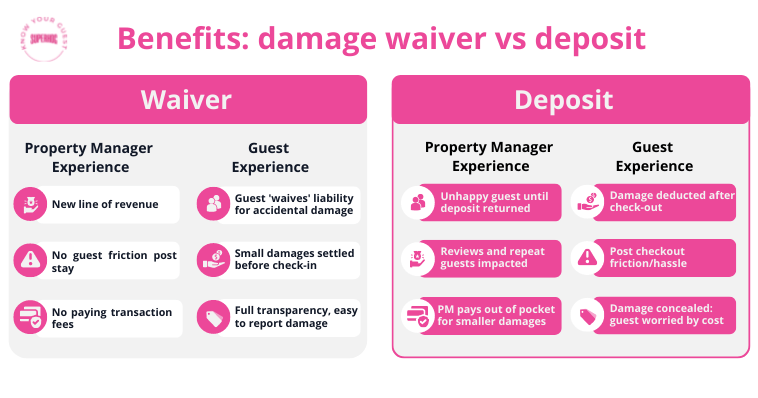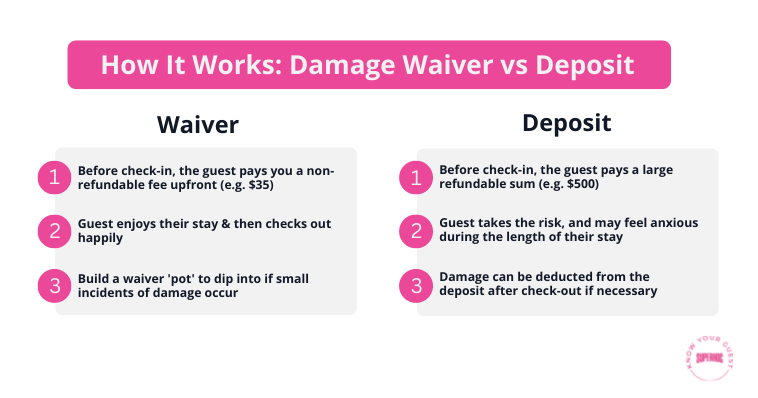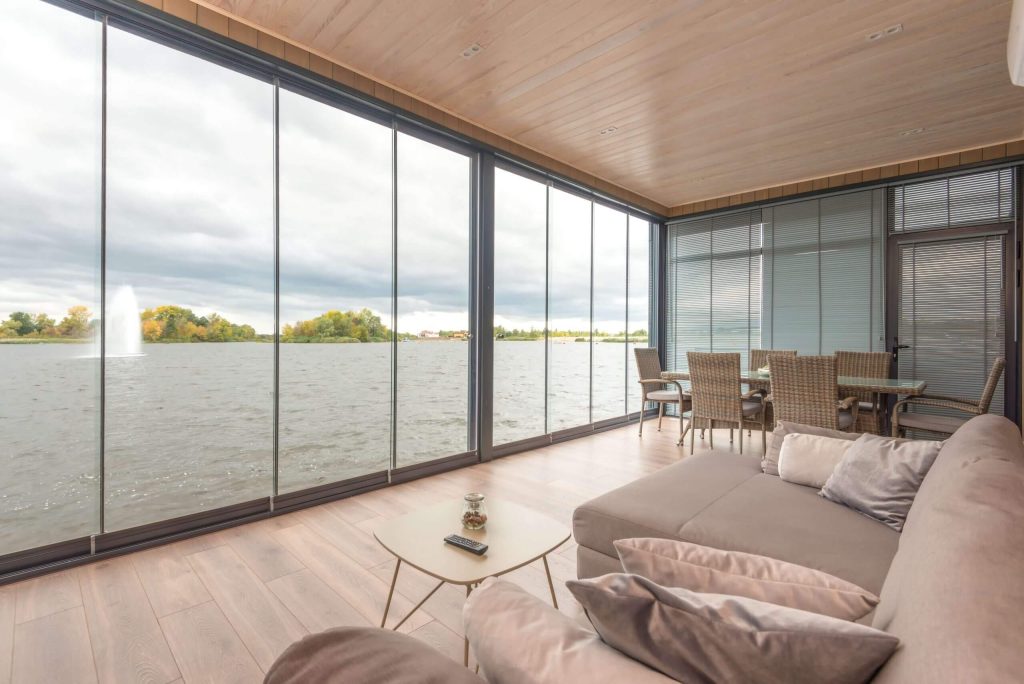Are you running a short-term rental and want to protect your business from guest-related damage, but are unsure of what avenue is best? You’re in the right place!
There is a view that property managers should not be taking a deposit from their guests due to a reduction in booking conversion rate. If something were to happen, you would be leaving yourself open to financial loss.
Making sure you hold your guests accountable can be the difference between a catastrophic loss, and an unfortunate (but salvageable) situation.
In this article, we’ll take you through everything you need to know about damage waiver and damage deposit‘s so you can decide which option best suits your short-term rental business.
Why do you need to implement a damage waiver or damage deposit?
“What business just lends a stranger hundreds of thousands or millions of dollars of assets, no questions asked?” Benjamin Earley, CEO of HOLT.
They wouldn’t. Yet, many property managers and owners do this every single day, no questions asked!
Have you ever rented a sports car for the day? That’s exactly what Benjamin’s wife did for a birthday surprise. Why is this relevant?
Simple. “The hoops she went through to get a $200k asset for 24 hours was weeks long and around 10-15 hours of work on documents, insurances, trip layouts and much more.” It’s tedious, but without it, there’d have been no Lamborghini waiting on the other side.
Property managers hand over much more expensive assets each and every day to their guests without any means of risk management in place. That leaves them vulnerable.
Benjamin Earley makes it incredibly clear why he implements a risk management strategy, including damage waivers and deposits in his short-term rental toolkit.
Having a deposit or waiver is the first step in managing risk, and if it does discourage guests, it’s likely those guests are not the type of guests you want.
Use the deterrent to your advantage because without a damage deposit or damage waiver in place, you’re not just leaving yourself vulnerable to guest damages; you are leading your business down a path of out-of-pocket payouts that could ultimately result in loss of revenue.
Here are a few other reasons property managers implemented damage waivers and deposits into their booking journey workflow:
- They help you improve the guest experience. Accidents happen. We know this, you know this, and guests know this. The security of having a waiver or deposit in place can help remove any friction such as bad reviews that can arise post-stay if an accident occurs. It also puts guests at ease knowing it’s been sorted ahead of time.
- Saves time and reduces manual labour: You can diminish the time associated with handling guest-related damages, chasing guests after their stay and the hassle associated with physically collecting and refunding deposits.
- Cover minor incidents of damage quickly: You won’t need to pay out of your pocket for guest damages. Get the balance of happy guests and happy owners, while ensuring you do not foot the bill every time an accident happens.

Damage waiver vs damage deposit: what is the difference?

There is clearly a need for damage waivers and deposit management. It gives homeowners peace of mind, helps to ensure that guests understand their potential liability for damages, and allows you to fix damage issues as quickly as possible.
But what is the difference, and how do you know which one best suits your short-term rental business?
Damage waiver vs damage deposit: the principal difference between them is that a damage waiver is a smaller, one-time, non-refundable fee. The larger short-term rental businesses typically prefer damage waivers due to their quick resolution time, revenue already being there and reduced guest conflicts from damaged items.
A damage deposit makes guests pay a certain amount during the booking process, which is held until the property is viewed after check-out. Smaller short-term rental business owners often prefer damage deposits. They cover all types of damages up to a limit, offering a sense of security, helping ensure guests respect the property, and giving greater leverage if something happens.
However, many property managers are moving away from the traditional damage deposit in favour of damage waivers. Many guests find it inconvenient to pay a large amount of money upfront and would instead, book with a competitor who doesn’t require a damage deposit.

How does a Know Your Guest short-term rental damage waiver work?
It’s a fact that every booking will incur some sort of damage: whether it be suitcase marks on the wall or broken glasses, all these little extras add up and there is no point in trying to claim it from a deposit. The hassle isn’t worth it.
With a damage waiver, every guest pays you a non-refundable $50 to waive damages of up to $500. If only one in ten bookings results in damages to the cost of $150, you would cover the cost of repairs and still have an extra $300* as either a profit or a pot that builds up in case of an emergency.
*(Know Your Guest takes a 10% fee to cover the transaction fee)
The more bookings you get, the bigger the pot gets, giving you the freedom to repair and replace items in your property as needed. Essentially, you will be creating extra income.
Not only does it benefit you, but you protect your guests from paying more for their stay than they had budgeted while eliminating disagreements with guests about whether or not they should be held responsible for certain damages.
Want to know more about how a Know Your Guest damage waiver can improve your efficiency and cash flow? Speak to us today!
>>Read how Nox rentals are using the Know Your Guest’s Damage waiver product
How does a Know Your Guest short-term rental damage deposit work?
With a damage deposit, every guest pays you $500 to cover damages up to the value of $500 before their booking starts.
Should the guest be responsible for damage during their stay, they’re liable to cover the costs with the deposit. You take the necessary payment from this to cover the cost of repairs.
If no damage has occurred, the full amount of money will be refunded to the guest.
By taking payments upfront, you are removing the potential disagreements with guests that can arise post-stay and allowing yourself, as a property manager, to cover guest-related damages quickly.
If you’d like to implement a risk management strategy, speak to us about our damage deposit option.
Top tips when choosing a damage waiver vs a damage deposit
When choosing between a damage waiver and a damage deposit for your short-term rental, it is essential to weigh out the pros and cons for your business in order to protect your property while still enticing guests. Here are some questions to consider:
- Think about the standard of your property: is it providing a luxury stay? Adjust your deposit or damage waiver to reflect this. If you are still worried about potential damages, you can always add damage protection to cover any miscellaneous harm your properties might be subject to.
- Who is your target guest? Do they have the means to provide large deposits, or would they benefit from a damage waiver?
- Think about your turnaround time: is it quick, or do you have periods of time between guests checking out and new guests checking in? Quick turnarounds would benefit from a readily available waiver pot to cover damages, while a longer turnaround allows time for disputes over damage deductions from a deposit.
Automating the management of short-term rental damage waivers
A professional short-term rental business should be looking for solutions that help better its efficiency and operations.
Not only are manual processes slow, but they can also hinder your guest’s experience and ultimately make your life harder. That’s why automating the management of short-term rental damage waivers or damage protection is a no-brainer.
Speak to us, and get your damage waiver or damage deposit implemented today!
